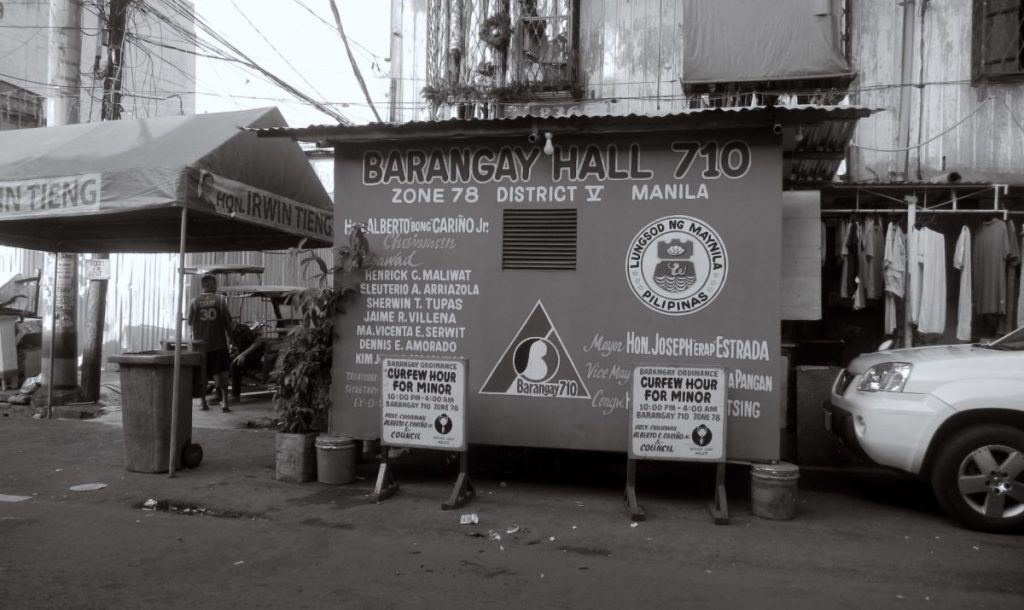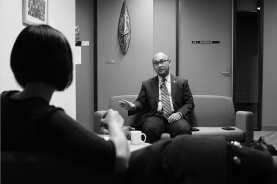In the Philippines, politicians understand that their constituents want a leader who’s humble; easily approachable; tough; and willing to fight for the poor. Knowing their audience all too well, they go on the campaign trail, shaking hands, mingling with voters, and making promises to the masses.
Filipino action film stars readily fit the mould. One of them, Joseph Estrada, was president from 1998 to 2001. A defender of the oppressed in his movies, he won on an “Erap-Para-Sa-Mahirap” (Erap for the Poor) platform. A fellow action star, Fernando Poe, Jr., tried to follow suit, and came so close to winning the presidential elections in May 2004.
President Duterte is the latest, and perhaps most successful, incarnation of this lineage of heroic leaders. He was never an action star, but he has been a spectacle in his own way. He boasts of the monikers, the “Punisher” (a reference to the hero of the eponymous Marvel comics series), and “Duterte Harry” (echoing Clint Eastwood’s Dirty Harry).
He ran on a platform of “Tapang at Malasakit” (Courage and Compassion). In 2017, a survey showed that 82% of respondents found him “most loving” while 79% saw him as “caring and concerned.” Supporters affectionately call him “Tatay” (father) Digong. Social media and the internet are awash with testimonies of his care. When he was mayor of Davao City, according to one account, he helped bring back to the Philippines the body of a Filipina worker who was killed in the Middle East. The family had difficulty in doing so, but Duterte “came to our rescue.”
Democracy advocates, from political scientists to civil society groups, underestimate such incidents and downplay the politics of caring. For them, it reflects a concern with personalities rather than institutions, and cultivates fanaticism or blind loyalty. They dismiss it as a mere tactic to deceive voters, and chide those who continually fall for these strategies. They see the politics of caring as a sham, uncovering the elitist, anti-poor policies (like the anti-drug war) of supposedly “caring” politicians.
Calling for voter education, they urge Filipinos to choose their leaders wisely, rely less on personalities, and build stronger institutions. They want a more rational, democratic, and scientific approach to Philippine politics.
The criticisms are justified. But the politics of caring cannot simply be dismissed, especially if we want to understand the popularity of the president. Power is embedded in everyday practice. To succeed, it must elicit the consent, even approval, of the governed. In the case of President Duterte and populist leaders, that consent involves the politics of care. If democracy entails listening to the people, it must seriously reckon how Filipinos actually think about politics.
So what can we learn from this predilection for caring leaders?
To answer this, we must treat the politics of caring not as deception or as a deviation from modern, rational, and institutional forms of politics. It should be seen as a framework on its own right, one with different yet legitimate assumptions about the relationship between the ruler and the ruled; the mode of governance; and the scale of political action. Specifically, the politics of caring projects an intimate relationship between the ruler and the ruled; prefers direct, hands-on governance; and posits a small sphere of political action.
Intimate Rule
In a class-divided Philippines, the politics of caring engenders the humility and solidarity of the leader with his constituents. This connection helps explain many of President Duterte’s policies and pronouncements, not least his penchant to depart from prepared speeches. If President Duterte speaks so informally—the language of the streets (gutter language)—that is precisely the point. It springs from his desire to erase—symbolically—the gap between him and his audience. For the president, political discourse is not about formal speeches delivered from a podium, but a casual yet intimate gathering. His emotionally attached supporters share this connection. In 2017, the television coverage of his State of the Nation Address deployed close-ups to project that intimacy.
Direct governance
This connection between the ruler and ruled entails direct, hands-on governance, which can be intimate and brutal. All governments have the power to punish, but President Duterte himself has threatened to kill drug users and addicts. His “I will kill you” tirades bring state punitiveness straight to the (alleged) offenders. By speaking to them directly, he bypasses institutions—like prisons and courts—that (normally) mediate between state and society, even as he deploys them to deadly effect.
In the drug war, the state infiltrates the most intimate of spaces—homes—and metes out punishment through brutal, physical contact. This hands-on approach alarms critics, who (rightly) condemn the impunity and see it as a violation of due process.
With his hands-on approach, President Duterte acquires a business-like decisiveness. Critics speak of his “capture” of state institutions. But for supporters, it paints him as a man of action whose policies exemplify his compassion and effect his much-vaunted change. After all, intimate relations invoke safety and protection, the rationales for the anti-drug war that he and his supporters give: “…I want to protect my community, the Filipino people. That’s my sworn duty,” he vowed.
Small-Scale Politics
The politics of caring lights up from a particular angle long-recognised features of Philippine society: the pursuit of family interests in politics, as McCoy and Roces show; and its deeply local nature (centred on provinces and towns outside Manila), as Abinales, Abad, and Pedrosa argue.
However, the politics of caring does not simply involve families or specific locales. It also pertains to the scale and scope of political action: a small sphere, where it is conducted face-to-face, but does not necessarily involve one’s kin. Pro-Duterte politics raises this micropolitical imaginary to the national level. Not only is he the “Tatay” of the Philippine household, with citizens as his “children,” he is also the “Mayor of the Philippines.”
Historical and contemporary perspectives
Where do all these political ideas come from?
The answer partly lies in the Philippines’ historical development. Before modern bureaucracies and state institutions, politics was primarily local, conducted among communities whose members more or less knew each other. When the Spaniards came, Filipinos (if they could be called such then) were living in political units called barangay. Each had up to a hundred families, and was headed by a datu or a rajah. Political space was consequently small; there were no bureaucracies and paperwork. This was no democracy, for sure, but from a historical perspective, it was not unusual.
In this sense, the intimate politics of caring arguably represents a hold-over from premodern social formations, and has figured in Filipino political thought ever since. Filipinos do not just conduct politics through close relationships, say, between friends and families. They also think about, and spoke of it, in those terms. Anti-Spanish revolutionaries saw kalayaan (freedom) not in its Western sense, but as, according to Ileto, “inseparable from its connotations of parent-child relationship, reflecting social values like the tendency of mothers in the lowland Philippines to pamper their children and develop strong emotional ties with them.”
During World War II, Manuel Quezon (1878–1944), president of the Commonwealth, complained of American abandonment: “…how typical of America to writhe in anguish at the fate of a distant cousin, Europe, while a daughter, the Philippines, is being raped in the back room!”
A tale of two political imaginaries
Today, social networks and kinship ties play a huge role in Philippine politics, from the highest echelons of the state to the everyday affairs of the barangay (village).
This “intimate politics” has survived because of many, complex reasons, including the weakness of Philippine institutions (Migdal’s weak state), and general poverty. The reach of the government—its modernity and Weberian rationality—is severely constrained; it leaves many sectors outside state control and subject to other, “non-rational, non-modern, non-institutional” modes of thinking. Filling the gaps are kinship ties and social networks, including the largesse of politicians or wealthy members of the community. These networks build a culture of (inter)dependence, if not patronage, and shape the practice and discourse of “intimate” politics.
In the Philippines then, there are two political imaginaries: a politics of caring that prefers direct contact between the ruler and the ruled, and another that focuses on strong institutions that depersonalises politics. Both embody different scales of political thinking. Circumscribed by the local and personal, the politics of caring exemplifies what Nick Joaquin called the Philippines’ “heritage of smallness.” It thinks small, personally, locally, and bodily, with its notion of trust, intimacy, safety, and protection.
In contrast, an impersonal, institutional politics thinks bigger, as it were, invoking “abstract” systems of freedom, human rights, and due process.
Lessons from feminist ethics and politics
Both political imaginaries may be incompatible, but it is precisely their collusion that has plagued Philippine society. Roces called it “kinship politics,” where families and their allies deploy the institutions of the state for their own interests.
It is wrong, however, to think that an intimate politics is inherently incompatible with institutional governance. It is reasonable to feel safe and seek protection (from drug addicts), to rely on families and friends, and to trust and feel close to a leader. After all, these are the raison d’etre of the state and its institutions. Thus, even if the intimate politics of caring is mere deception, it cannot be simply dismissed. It represents legitimate political conceptions. More importantly, the relationship between the two political imaginaries can be reconfigured in ways where both are compatible and mutually constitutive.
But how and to what extent can we do so? How, if at all, does one channel an intimate politics of caring into building and strengthening institutions that really care for the people? How does one do so without reinforcing the practices of political patronage and clientelism? How can we build impersonal institutions in a society that prefers direct connections with leaders? How do we think intimately when are governing a nation of over 100 million?
Philippines beyond clichés series 1 #2: Dynasties
Do political dynasties hold back The Philippines' economic development? Nicole Curato investigates this question with Assoc Prof Ronald Mendoza.
The ethics of care recognizes the moral value of and importance of relations of family and friendship…Having grasped the value of caring relationships…., the ethics of care often examines social and political arrangements in the light of these values. In its more developed forms, the ethics of care as a feminist ethic offers suggestions for the radical transformation of society…. [I]t reconceptualizes traditional notions about the public and the private.’
This is not the place to flesh out the details of this politics. But the future of Philippine democracy may well depend on the extent it can accommodate a politics of intimacy with questions of institution-building, and modern, rational forms of governance. After all, if power is to become hegemonic in the Gramscian sense, then it has to be equally embedded in everyday life. Thus, if Filipinos do think intimately, then a progressive politics in the Philippines must (continue to) factor this mindset in; it cannot just impose modern, “rational” political standards or educate Filipinos into political maturity.
The advancement of Philippine democracy cannot simply occur in linear fashion, where the politics of caring eventually yields to institutional politics. It has to accommodate both. And this recognition of a dual political system is a “nonlinear emplotment” of Philippine political development.
 Facebook
Facebook  Twitter
Twitter  Soundcloud
Soundcloud  Youtube
Youtube  Rss
Rss 



